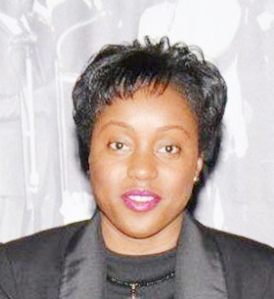In a further sign of the growing international interest in the political crisis over a date for general elections, a team from the Commonwealth Secretariat, which will be in Guyana for four days beginning today, is scheduled to meet with the Guyana Election Commission (GECOM) tomorrow.
“We will meet with them on Thursday at 1 pm,” opposition-nominated Commissioner Bibi Shadick told reporters yesterday following another GECOM statutory meeting that ended prematurely.
According to the commissioners, the delegation, which comprises of Adviser and Head of the Electoral Support Section Martin Kasirye and Head of Good Offices for Peace and Adviser for the Caribbean region Dr. Tres-Ann Kremer, will arrive this evening and is scheduled to leave on Saturday.
The Commonwealth was one of the international groupings that were written to by Opposition Leader Bharrat Jagdeo in the aftermath of the deadlock over the December 21, 2018 motion of no confidence which the government had refused to recognize. If there are concerns about the violation of constitutional rule here, Guyana could be reported to the Commonwealth Ministerial Action Group (CMAG). That group engages with countries where Commonwealth fundamental political values are at risk.
According to the Commonwealth Secretariat website: “The group now assesses concerns such as the unjustified postponement of elections, egregious violations of human rights, the undermining of the judiciary, lack of space for the opposition, and systematic constraints on civil society and the media.
“CMAG may agree measures for collective action to deal with persistent or serious violations of Commonwealth values, including suspending membership of the Commonwealth or even recommending expulsion”.
Last week a team from the Carter Center tried to broker an agreement over an elections date but this has been overtaken by a decision of the Court of Appeal.
Meanwhile, the opposition-nominated commissioners once again walked out of a meeting yesterday over the GECOM Secretariat’s failure to acquiesce to their request that a work programme for an election in 2019, which does not include a house-to-house registration exercise, be presented for consideration.
The seven-member commission met for three hours, during which the members “went through a whole set of minutes,” but once the meeting moved to the agenda item of elections, Shadick asked Chief Election Officer Keith Lowenfield if a work programme which did not cater for house-to-house registration was available. She walked out once he said no.
She followed Commissioner Robeson Benn, who had left an hour earlier after government-nominated commissioner Vincent Alexander successfully objected to the listing of an agenda item as “elections 2019.”
According to Benn, it was clear at that moment that elections in 2019 was being completely taken off the table and he felt no need to participate in the meeting after that.
“I decided to leave. I don’t think the meeting is useful at this time or will lead to any useful decision,” Benn told reporters after declaring that he and the other opposition-nominated commissioners continue to call for the commission to “cease and desist all actions related to house-to-house registration.”
Alexander, meanwhile, explained that his objection to the agenda item was directed by the recent Appeal Court decision which invalidated the vote on the no-confidence motion of December 21st, 2018.
“We have no mandate for elections in 2019. So, I objected to the agenda item being specific to 2019,” he explained.
Prior to the court’s decision, GECOM had indicated that it could not meet the constitutional deadline stipulated for the polls as a result of the passage of the opposition-sponsored motion on a vote of 33 to 32 members of the National Assembly.
In a letter to President David Granger, which was in response to a request for a work programme that would see the holding of credible polls in the shortest time, GECOM Chairman James Patterson had advised that the commission would be in a position to conduct General and Regional Elections no later than late November 2019 after house-to-house registration.
He also indicated that the commission would need “an amount of $3.5 billion” and stressed that “additional resources” would be needed to facilitate an early end to the house-to-house process, which the Secretariat originally projected would be concluded in February 2020.
Patterson said that he has been assured that with a “significant increase in the allocated resources for the exercise and an adjustment in the management arrangements for some procurement activities, the execution of the programme could be restructured to be completed at least two months earlier, in 2019.”
Should this be achieved, he argued, most of the commission’s concern for credibility and timeliness, and indeed most stakeholders, would be addressed. “I would, therefore, urge you to support this by providing the required additional resources and appropriate guidance to those agencies and authorities whose co-operation is required if our objectives are to be achieved,” he added.
President Granger was expected to announce a 2019 date for elections based on his advice but it remains to be seen whether he would proceed to do in light of the Appeal Court’s ruling. Polls are otherwise constitutionally due in 2020.






